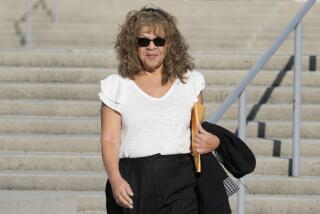Robbins Tells of Laundering Campaign Funds : Trial: The ex-legislator from the Valley testifies in the federal corruption case against lobbyist Clayton R. Jackson and former state Sen. Paul Carpenter.
- Share via
SACRAMENTO — Former state Sen. Alan Robbins testified Monday that he laundered campaign funds through a Santa Monica public relations firm in an elaborate conspiracy and suggested to the business’ owner that she destroy incriminating financial documents.
The onetime San Fernando Valley Democrat said he told Jennifer Goddard, the firm’s owner and one of his former staff members, that she probably didn’t need to keep the documents and “later understood she had a bonfire to destroy records.”
Robbins did not spell out the material he believed was burned as he testified at the start of the third week in the federal public corruption trial of former Sen. Paul B. Carpenter (D-Downey) and influential lobbyist Clayton R. Jackson.
A grand jury alleged in February that Jackson induced unsuspecting lobbying clients to illegally make contributions to Carpenter’s campaign committee. Carpenter then allegedly used the mails to channel the funds to Goddard’s firm in exchange for public relations work.
Both defendants have pleaded innocent. Carpenter, a former member of the state Board of Equalization, is charged with 11 counts of conspiracy, money laundering and obstruction of justice. Jackson is charged with 10 counts of racketeering, conspiracy and money laundering.
Robbins testified last week and again Monday that he told Goddard how to spend the funds--on such items as a print by modern artist Erte--or to pay his friends for work they had not performed for her public relations firm.
“I enjoyed being able to call her up and direct her to spend money,” Robbins conceded on Monday under questioning by Carpenter’s lawyer, Charles F. Bloodgood.
In December, 1991, Robbins plead guilty to corruption charges and is completing a two-year federal prison sentence. In pleading guilty, Robbins said Jackson arranged for the money to be paid to Carpenter “at my direction and for my benefit.” Carpenter, in turn, paid the money to the Goddard company and she made the money available for Robbins’ personal use--in violation of the law. Robbins said he first met Goddard when he was running for the Senate in 1973 and she was student body president of Valley College.
Later, he said, she joined his Senate staff and eventually they become “romantically involved” for a brief time. When she started her own firm, Robbins said he directed business her way.
Robbins acknowledged that about late 1988 or 1989 they may have had a disagreement about how the money was to be spent. “She is what you call a strong-willed person,” Robbins said.
But, he maintained, “as a general rule” he directed her how to spend the funds, other than a portion she retained.
He said that at one point in the mid-1980s he told Carpenter that he had excess campaign money from Jackson’s clients, including major insurance firms, he wanted to funnel to Goddard.
Under questioning designed to undercut his credibility, Robbins admitted that he kept Carpenter in the dark about how the money would be spent. He told Bloodgood that at no time did he ever tell Carpenter that the funds eventually would be spent at his direction.
During a recess, Bloodgood called the admission “very significant” for his client’s defense and Carpenter said he believed that it undermined the fraud charges against him.
Robbins also admitted that he had made a mistake as the FBI investigation was heating up in 1989. He said federal authorities urged him to cooperate in exchange for a grant of immunity. “I foolishly declined,” he said.
“I figured it was all going to go away. If I accepted the offer of immunity, that it would ruin my career.”
More to Read
Sign up for Essential California
The most important California stories and recommendations in your inbox every morning.
You may occasionally receive promotional content from the Los Angeles Times.













